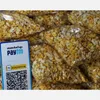How the 7 recently listed startups stack up against the broader market
A quick analysis of the seven Indian tech startups that went public in 2021 as glocal factors have marred equity markets, pushing key indices to a 12-month low.
The Ukraine-Russia war, burgeoning inflation and central banks’ interest rate hikes to tame inflation are the mix of glocal macroeconomic factors that have brought back the gloomy times for global equity markets, and India is no exception.
At home, the Reserve Bank of India (RBI) is on a rate-hiking spree, in order to tame inflation which is sailing above the central bank’s tolerance zone. And, the fear of a delayed monsoon is another factor worrying investors.
On Thursday, June 16, the 30-stock S&P BSE Sensex tanked nearly 1,116 points (-2.12 percent) over its previous day’s close, to touch the 52-week low of 51,425.48 points.
Similarly, National Stock Exchange’s Nifty 50 fell a little over 357 points (-2.28 percent) to touch the 52-week low of 15,335.1 points.
At Thursday’s close, Sensex and Nifty closed lower by 1.99 percent and 2.11 percent each compared to their previous close.
According to Siddhartha Khemka, Head - Retail Research, , global markets too slumped during the day over recessionary fear after the US Fed raised interest rates by 75 basis points, or 0.75 percent–the biggest rate hike since 1994.
“Further the Fed Chair Jerome Powell signalled another big move (50-75 basis points’ hike) next month, intensifying its fight to contain rampant inflation,” Siddhartha said in a reaction note.
The US Fed has sharply increased the interest rate target to 3.4 percent for 2022 and 3.8 percent for 2023.
“Going ahead, markets are likely to stay under pressure amidst worry over significant economic slowdown,” he warned. “Further delay in monsoon is also denting sentiments as it might further push the rural demand recovery.”
Deepak Jasani, Head of Retail Research at HDFC Securities, opines that the Nifty has breached the crucial support of 15,660–15,700 and this level will now act as a resistance.
In a market wrap note from HDFC Securities, Deepak was quoted saying, “Rate hike fears have depressed expected valuations of stocks on the one hand, while making debt instruments attractive.”
“Stubbornly high inflation is impacting sentiments while fears of recession (that could bring down inflation) could lead to earnings downgrades,” he added.
Ajit Mishra, Vice President - Research at Religare Broking, echoes similar views and opines that after the decisive break down below 15,650 in Nifty, the next major support zone exists around the 14,800–15,000 zone.
“Markets are sceptical about how the global economies would attain growth amid the aggressive tightening,” Ajit said in a market reaction note.
Given the scepticism prevailing in the global and domestic economies and markets, YourStory Research took stock of the share price movements of the seven Indian tech startups that got listed in 2021.
The daily share prices on BSE, as well as the closing values of the S&P BSE IPO index and the S&P BSE Sensex, have been rebased to 1,000 since the respective stocks’ listing dates to make a fair assessment of where do these companies’ share prices stand on a relative basis.
Zomato
The foodtech unicorn, which went public at an issue price of Rs 76 a share in July 2021 and got listed on July 23 last year had closed at Rs 125.85 on its listing day.
On Thursday, closed at Rs 67.1, corrected by Rs 102 (-60.32 percent) apiece compared to its 52-week high price of Rs 169.1 on November 16 last year.
However, the stock closed higher by Rs 16.75 (+33.27 percent) apiece when compared to its 52-week low price of Rs 50.35 on May 11, 2022.
CarTrade
Automobile marketplace CarTrade Tech had listed in August 2021 with an issue price of Rs 1,618 per share and had closed at Rs 1,500 apiece on its listing day on August 20, 2020.
On June 16, at Rs 615.2, the closing price of stood corrected by Rs 994.8 (-61.79 percent) apiece compared to its 52-week high price of Rs 1,610 on August 20 last year.
However, the stock closed higher by Rs 153.1 (+33.13 percent) apiece when compared to its 52-week low price of Rs 462.1 on February 24, 2022.
Nykaa
FSN E-Commerce Ventures, the parent entity of online beauty marketplace , had made a strong public market debut in November 2021 with an issue price of Rs 1,125 apiece. On November 10, 2021–its listing day–Nykaa closed the trading day at Rs 2,206.7 per share.
On June 16, Nykaa’s closing price of Rs 1,431.05 apiece was corrected by Rs 1,142.95 (-44.4 percent) compared to its 52-week high price of Rs 2,574 apiece on November 26 last year.
However, in comparison to the 52-week low price of Rs 1,208.4 apiece on May 12, 2022, the share was higher by Rs 222.65 (+18.43 percent) on June 16.
Policybazaar
PB Fintech, the parent entity of Policybazaar, went public in November last year at an issue price of Rs 980 per share. On November 15–its listing day–the scrip had closed at Rs 1,202.9 per share at the end of the day’s trade.
On June 16, closed the trading day at Rs 578.05 apiece, which is a correction of Rs 891.95 (-60.68 percent) per share against its 52-week high price of Rs 1,470 per share on November 17, 2021.
However, in comparison to its 52-week low price of Rs 542.3 on May 12, 2022, Thursday’s closing price is higher by Rs 35.75 (+6.59 percent) apiece.
Paytm
One 97 Communications, which operates , had gone public in November last year at an issue price of Rs 2,150 per share. On November 18–its listing day–Paytm had closed the trading day at Rs 1,564.15 per share.
On June 16, Paytm’s closing share price of Rs 613 has corrected by Rs 1,348.05 (-68.74 percent) apiece compared to its 52-week high price of Rs 1,961.05 on November 18 last year.
However, the stock closed higher by Rs 102 (+19.96 percent) apiece when compared to its 52-week low price of Rs 511 on May 12, 2022.
RateGain
Travel-SaaS (Software-as-a-Service) platform RateGain Travel Technologies also went public in November last year at an issue price of Rs 425 per share, and got listed on December 17, 2021, when it closed the listing day at Rs 340.5 apiece.
At the close of trade on June 16, at Rs 266.7 apiece has witnessed a correction of Rs 258.3 (-49.2 percent) apiece compared to its 52-week high price of Rs 525 per share on January 18, 2022.
On June 16, RateGain hit its 52-week low price of Rs 264 a share, before recovering by a paltry Rs 2.7 (+1.02 percent) apiece.
MapmyIndia
C.E. Info Systems, which runs , was the last of the seven tech startups that debuted on the bourses in December 2021. Compared to its issue price of Rs 1,033 per share, MapmyIndia closed the trading day on December 21, 2021–its listing day–at Rs 1,394.55 apiece.
On June 16, MapmyIndia closed the trading day at Rs 1,301.7 per share, which was a decline of Rs 616.65 (-32.14 percent) compared to its 52-week high price of Rs 1,918.35 on January 17, 2022.
However, in comparison to the 52-week low price of Rs 1,129.5 per share on May 11, 2022, MapmyIndia’s June 16 closing price was higher by Rs 172.2 (+15.25 percent) apiece.
Edited by Saheli Sen Gupta










